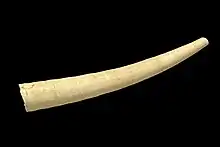Antalis vulgaris
Antalis vulgaris, commonly known as the common tusk shell, is a species of scaphopods mainly encountered on sandy bottoms from 5 to 1000 meters depth.[1]
| Antalis vulgaris | |
|---|---|
 | |
| Scientific classification | |
| Domain: | Eukaryota |
| Kingdom: | Animalia |
| Phylum: | Mollusca |
| Class: | Scaphopoda |
| Order: | Dentaliida |
| Family: | Dentaliidae |
| Genus: | Antalis |
| Species: | A. vulgaris |
| Binomial name | |
| Antalis vulgaris (da Costa, 1778) | |
| Synonyms | |
|
Dentalium vulgare (da Costa, 1778) | |
Description
Antalis vulgaris is a small mollusc of 3 to 6 cm length with a characteristic elephant tusk shape. Its shell is opaque white and displays closely spaced longitudinal striations on the posterior portion. The anterior aperture (thinnest end) is circular and is occluded by a septum with a central pipe bearing a circular orifice.[2]
Distribution
The common tusk shell is found from south-western United Kingdom to western Mediterranean.[3]
Behaviour
Diet
The species stands vertically in soft grounds and search the sand with specific adhesive tentacles (captacula) for small benthic species such as foraminifera.[3][4]
Reproduction
Separated sexes. The fecundation is external and gives rise to planktonic larvae called trochophore.[3]
Similar species
- Antalis entalis (Linnaeus, 1758) is smaller (4cm), has a pyriform-shaped anterior orifice and has no longitudinal striations.
- Fustiaria rubescens (Deshayes, 1825) is smaller (3.5cm) and has a pink coloration.
- Ditrupa arietina (O. F. Müller, 1776) is an annelid belonging to the polychaete class and living in a calcified conical tube.[3]
References
- "Antalis vulgaris, tusk shell". www.sealifebase.ca. Retrieved 2019-02-25.
- Hayward, P. J.; Ryland, J. S. (2017). Handbook of the Marine fauna in North-West Europe. Oxford University Press (GBP). ISBN 9780199549443. OCLC 962330493.
- "Antalis vulgaris | DORIS". doris.ffessm.fr. Retrieved 2019-02-26.
- Audibert, Cédric; Delemarre, Jean-Louis (2009). Guide des coquillages de France Atlantique et Manche. Paris: Belin. ISBN 9782701146713. OCLC 690331649.